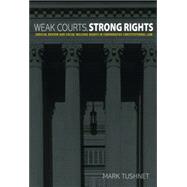
Note: Supplemental materials are not guaranteed with Rental or Used book purchases.
Purchase Benefits
What is included with this book?
| Preface | p. ix |
| Acknowledgments | p. xv |
| Strong-Form and Weak-Form Judicial Review | |
| Why Comparative Constitutional Law? | p. 3 |
| Alternative Forms of Judicial Review | p. 18 |
| The Possible Instability of Weak-Form Review and Its Implications | p. 43 |
| Legislative Responsibility for Enforcing the Constitution | |
| Why and How to Evaluate Constitutional Performance | p. 79 |
| Constitutional Decision Making Outside the Courts | p. 111 |
| Judicial Enforcement of Social and Economic Rights | |
| The State Action Doctrine and Social and Economic Rights | p. 161 |
| Structures of Judicial Review, Horizontal Effect, and Social Welfare Rights | p. 196 |
| Enforcing Social and Economic Rights | p. 227 |
| Table of Cases | p. 265 |
| Index | p. 269 |
| Table of Contents provided by Publisher. All Rights Reserved. |
The New copy of this book will include any supplemental materials advertised. Please check the title of the book to determine if it should include any access cards, study guides, lab manuals, CDs, etc.
The Used, Rental and eBook copies of this book are not guaranteed to include any supplemental materials. Typically, only the book itself is included. This is true even if the title states it includes any access cards, study guides, lab manuals, CDs, etc.